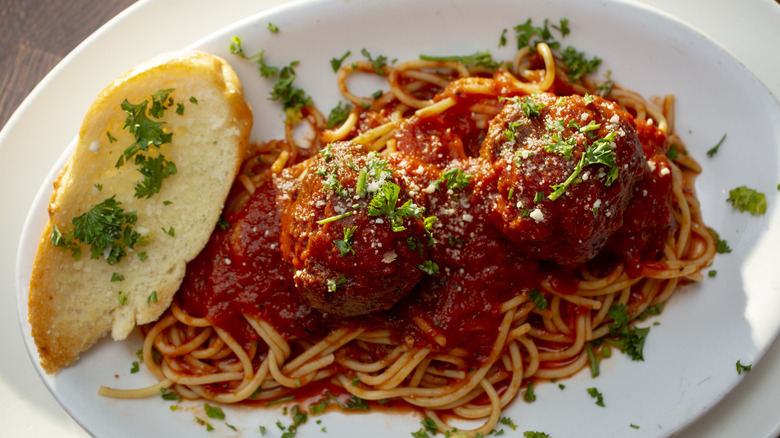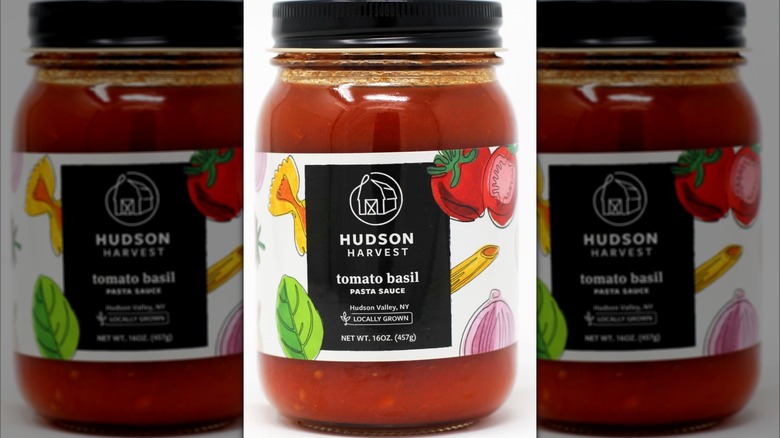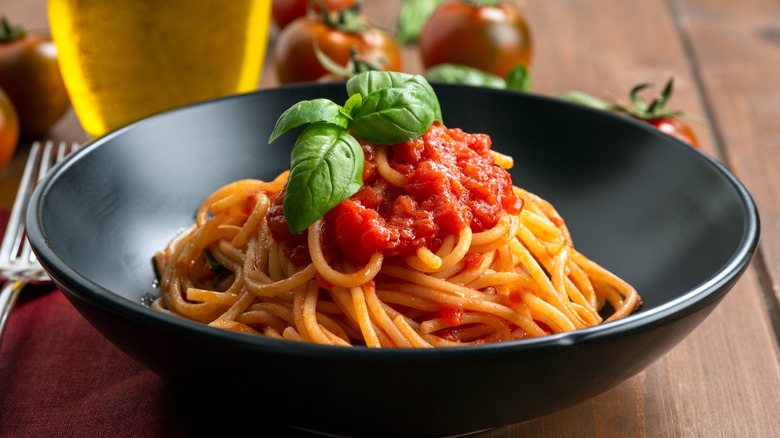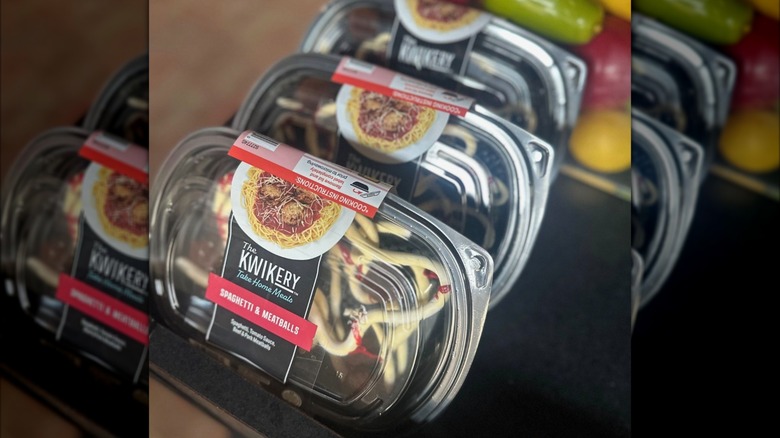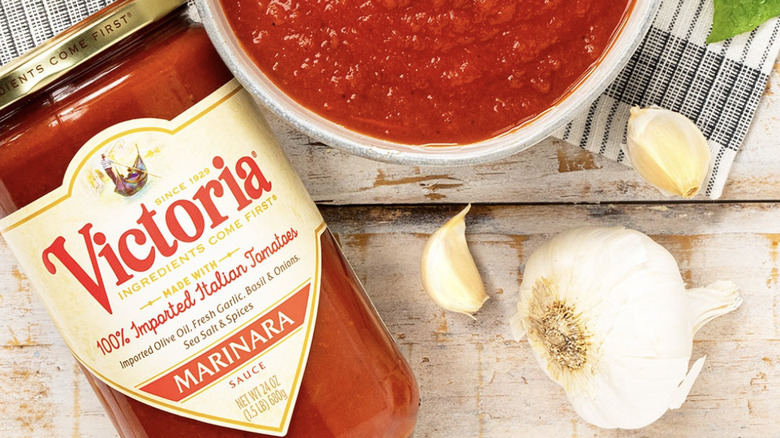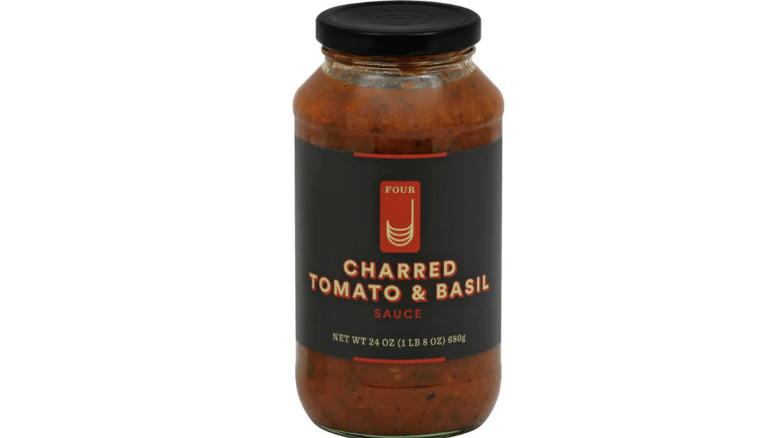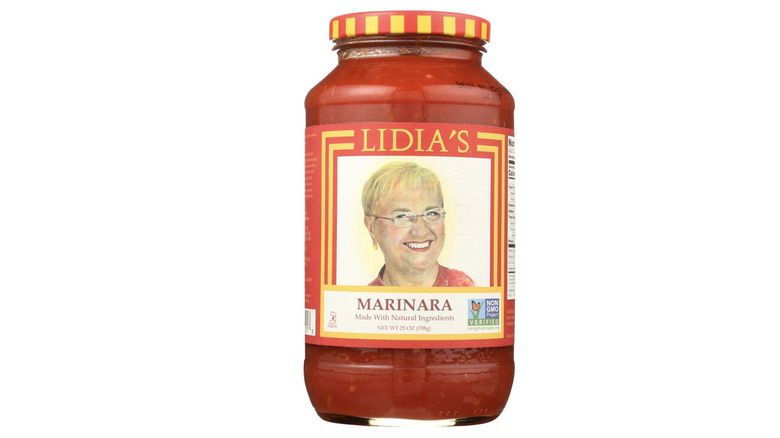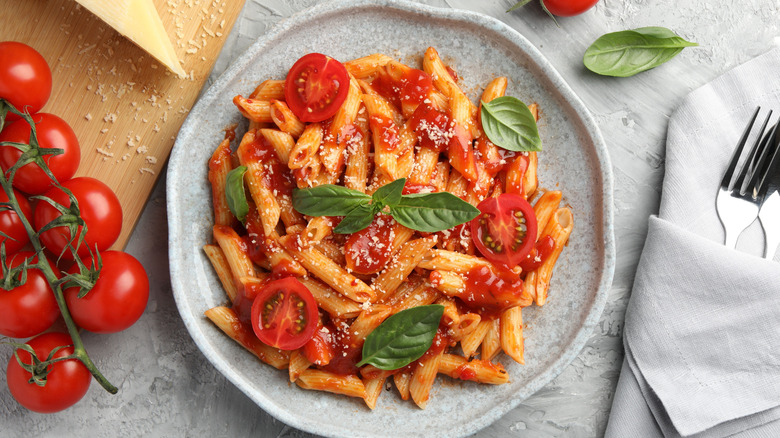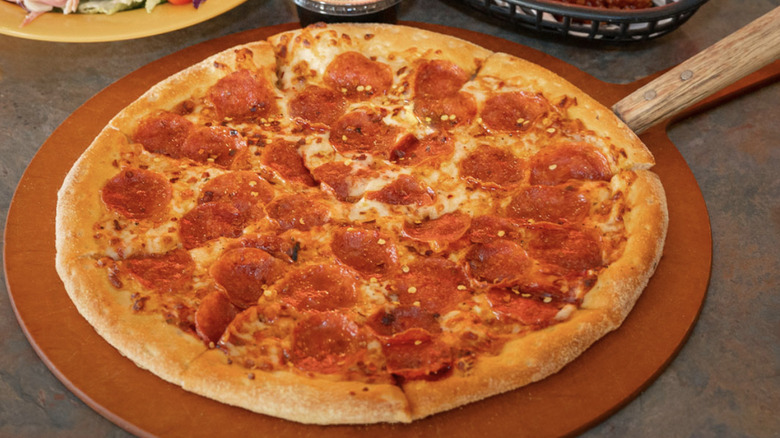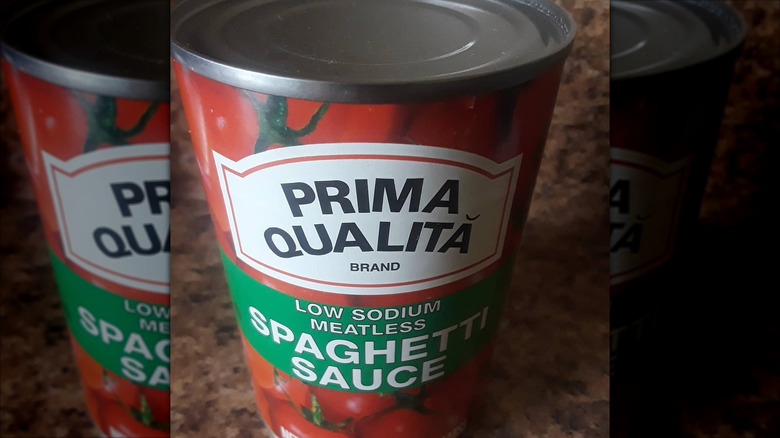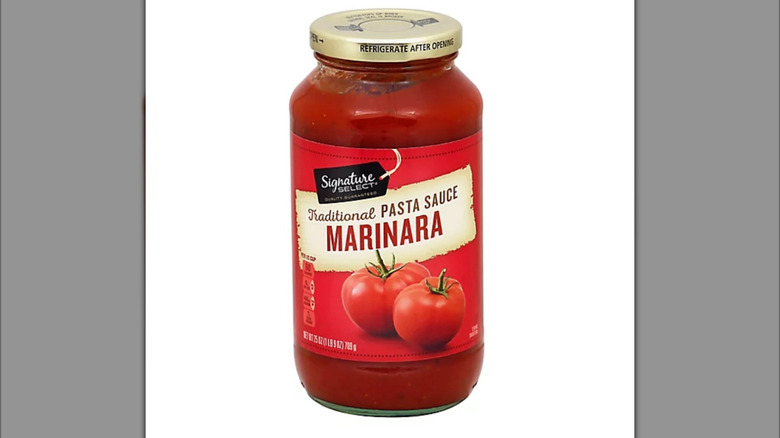Marinara Sauce Recalls That Affected Millions
We may receive a commission on purchases made from links.
Easy to prepare, yet delicious and incredibly versatile, marinara sauce consists of tomatoes, olive oil, garlic, salt, pepper, and herbs like dried oregano, and fresh parsley or basil. For an extra depth of flavor, the sauce is sometimes made with additional ingredients like white wine and diced onions. While marinara is most typically added to pasta, it's also a popular choice for pizza, seafood, meatballs, and lasagna.
It may seem like a fuss-free pantry staple, but many things can go wrong with the ready-made supermarket version of the product — and we aren't just talking about kitchen mishaps. Sometimes, the problem begins before the sauce even ends up in the pantry. Marinara sauce products can be recalled due to a range of issues such as undeclared allergens, under-processing, and microbial contamination.
Ready to find out about the biggest marinara sauce safety scares in recent history? Take a look at our roundup of some of the most alarming recalls in the U.S. If marinara sauce isn't your thing, check out our stories covering major egg recalls or pork recalls that affected millions.
Hudson Harvest recalls Tomato Basil Sauce due to potential under-processing (2024)
When jars of tomato sauce begin to exhibit signs of leaking or even bursting, it's time for a plan B. This is exactly what Hudson Harvest faced in mid-2024, when the company recalled its Tomato Basil Pasta Sauce. Jar defects can be an indication of spoilage and harmful bacteria, in this case, raising the concern that the product might have been under-processed. The voluntary recall involved 16-ounce glass jars of Tomato Basil Sauce distributed across New York, Connecticut, and Massachusetts. Luckily, no adverse health effects had been linked to the product at the time.
The FDA classified the Hudson Harvest Tomato Basil Pasta Sauce recall as a Class II incident, which means it could "cause temporary or medically reversible adverse health consequences [...] where the probability of serious adverse health consequences is remote." While the specific cause of the jar damage wasn't disclosed, the defects may have been related to under-processing. When jars of food aren't processed thoroughly enough to eliminate all pathogens, the bacteria that remain in the sauce can start producing gas, leading the jars to leak or burst under pressure.
Scratch Pasta recalls Marinara Sauce over mislabeling concerns (2023)
Mislabeling is one of the most common reasons for food recalls in the U.S. After all, any undeclared allergens or errors in ingredient lists on product packaging can have serious consequences for consumers with food allergies or dietary restrictions. An undeclared allergen is precisely what landed Scratch Pasta in hot water when the company failed to declare that its marinara sauce contained milk. While the label mentioned butter on the ingredient list, specifying that it was made from cream and natural flavor, this wasn't deemed sufficient under FDA guidelines, which require that milk be listed directly on the packaging.
The FDA officially classifies milk as one of the nine major food allergens, alongside fish, shellfish, eggs, tree nuts, wheat, peanuts, soybeans, and sesame. Given the severity of the oversight, the agency gave the Scratch Pasta Marinara Sauce recall a Class II rating, indicating that the product posed a moderate health risk. Although Scratch Pasta's Marinara Sauce was only shipped to one customer in Virginia, all in all, the recall still affected 304 cases of sauce, equating to 2,793 pounds of product that had to be pulled from distribution.
Hungryroot recalls Marinara Sauce due to contamination with yeast and mold (2023)
Founded in 2015, Hungryroot is an innovative company that offers an AI-powered grocery and meal planning service, which provides consumers with personalized grocery selections and customized recipes. When it first started, Hungryroot offered just six food items, increasing to more than 60 items by 2019 and 600 by 2023. One of these products was a marinara sauce with crushed tomatoes, garlic, olive oil, oregano, and black pepper.
In 2023, Hungryroot's marinara sauce, as well as its creamy vodka sauce, were both subject to a voluntary recall when it was discovered that they were contaminated with mold. The products also had an elevated yeast level. The recall warranted a Class II classification, highlighting that it could cause "temporary or medically reversible" health effects.
While it was never made clear how the marinara sauce ended up with mold and high yeast levels, Hungryroot took immediate action to remove the affected batches from circulation. At the end of the day, the company recalled 81,312 units of Hungryroot Marinara Sauce, amounting to 61,199 pounds of cooking sauce that had to be withdrawn from the market.
Kwik Trip recalls Spaghetti & Meatballs in Marinara Sauce over fears of metal contamination (2020)
Founded in 1965 in Eau Claire, Wisconsin, Kwik Trip is a chain of convenience stores and gas stations. There is little doubt that the chain has been a success, expanding to nearly 900 locations, with the greatest presence in Wisconsin, Minnesota, and Iowa. In addition to standard grocery store items like snacks and soft drinks, Kwik Trip offers a range of take home meals like macaroni and cheese, chicken penne, and beef Stroganoff. One such on-the-go meal came under scrutiny in 2020 due to potential contamination with metal fragments.
The incident involved 15-ounce plastic trays of heat-treated, partially-cooked spaghetti and meatballs in marinara sauce. The product had only been shipped to Kwik Trip locations in Wisconsin, Minnesota, and Iowa, where the chain has the biggest footprint. The pieces of metal were brought to Kwik Trip's attention after several customers complained about finding a foreign material embedded in the meatballs. It's uncertain how the metal found its way into the grab-and-go meals, though such contamination usually occurs during processing. At the time, no injuries were tied to the product.
Mizkan America recalls Ragú-branded pasta sauces due to potential contamination with plastic fragments (2019)
Dating back to 1811, when Matazaemon Nakano started producing fermented vinegar in Honda, Japan, Mizkan America was established in the U.S. in the 1970s, and made its mark in the condiment business. Today, the company owns several brands, including Ragú, Bertolli, Angostura, and Holland House. In 2019, Mizkan America drew widespread attention after issuing a recall of several products due to fears over possible contamination with shards of plastic.
The affected products included 45- and 66-ounce jars of Ragú Chunky Tomato Garlic & Onion, 66-ounce jars of Ragú Old World Style Traditional, and 66-ounce jars of Ragu Old World Style Meat. It was believed that the affected products had been manufactured over a five-day period between June 4 and 8.
The company never disclosed how the plastic fragments may have ended up in the tomato sauce. Nevertheless, a spokesperson for Mizkan America said at the time that the issue was detected during the company's "normal course of operations and quality checks," per Consumer Reports. While no injuries were linked to the sauce, the repercussions for Mizkan America were considerable, with the company pulling 9,130 cases of sauce from the shelves.
B&G Foods recalls Victoria Marinara Sauce amid fears of an undeclared ingredient (2019)
B&G Foods is an industry giant, known for its wide portfolio of brands, including Crisco, Baker's Joy, and Devonsheer. From shelf-stable foods to frozen goods, the company's diverse offerings can be found in most supermarket aisles. One of the labels under B&G Foods' umbrella is Victoria, a brand that specializes in pasta sauces. In 2019, B&G Foods announced a recall of Victoria Marinara Sauce due to the possible presence of an undeclared ingredient.
Just as one would expect, Victoria Marinara Sauce is made with tomatoes, onions, garlic, basil, and olive oil. What is less obvious is that the product may contain cashews — an ingredient that wasn't listed on its label. The company was alerted to the possible problem after a customer who was allergic to cashews reported suffering an allergic reaction to the product. The contamination was traced back to the marinara sauce produced at a single facility over a one day period. Altogether, B&G Foods ended up recalling 1,280 cases of 40-ounce jars of Victoria Marinara Sauce.
Cookwell & Company recalls Four J Charred Tomato & Basil Sauce over concerns about undeclared allergens (2018)
While one undeclared allergen can lead to a serious health crisis, imagine the risk associated with three different allergens omitted from a single product label. This is precisely what happened in 2018, when Cookwell & Company had to pull its 24-ounce jars of Four J Charred Tomato & Basil Sauce from grocery store shelves. The offending ingredients that may have been present in the sauce included soy, wheat, and fish. All three appear on FDA's "Big 9" list of the most common allergens. It's unclear whether these ingredients were a part of the intended recipe or ended up in the sauce as a result of cross-contamination.
While Cookwell & Company's Four J Charred Tomato & Basil Sauce had only been distributed in the state of Texas at the time of the recall, even regional sales can pose significant health risks. When all was said and done, a total of 6,522 units of the sauce were withdrawn from the market. Luckily, no adverse health issues were linked to the product at the time.
Nonna Foods recalls Lidia's Marinara sauce because of an undeclared allergen (2017)
Nonna Foods is the brainchild of celebrity chef, restaurateur, cookbook author, and television host Lidia Bastianich, who established the venture along with her daughter and son-in-law. The company sells Lidia's cookbooks, cookware, olive oil, as well as sauces. One of these is Lidia's non-GMO Marinara Sauce made with imported Italian plum tomatoes.
Lidia's Marinara Sauce was recalled in 2017, after company executives discovered that jars of Lidia's Vodka Sauce were wrongly labeled as Lidia's Marinara Sauce. Lidia's Vodka Sauce contains milk whereas Lidia's Marinara Sauce does not. This posed a problem since milk is a known allergen that can trigger serious — even life-threatening — reactions in individuals who are sensitive to the ingredient. The 25-ounce glass jars of sauce had been shipped to distributors across the U.S. To everyone's relief, no cases of adverse reactions to the marinara sauce were reported.
Home Maid recalls ravioli with pasta sauce due to misbranding and lack of inspection (2016)
When it comes to meat, poultry, and vegetables, even a slight glitch in processing can have disastrous consequences. This is the reason for the strict federal oversight of these products. It's also one of the reasons why several beef ravioli items — including variants with marinara-style sauce — were pulled off the shelves in 2016. The two suspect Home Maid Ravioli Company products included Ravioli and Spaghetti Italian Style Sauce and Ravioli with Sauce. One-quart and 1-gallon plastic containers of Italian Style Pasta Sauce were also affected by the recall.
Whether this was related to the lack of federal inspection or not, the ravioli and sauce products were found to contain whey and pork, both ingredients that were not listed on the packaging. Whey is a known allergen that appears on FDA's list of nine major allergens (as a component of milk), while pork is a huge no-no for certain religious groups and individuals with specific dietary preferences. At the end of the day, Home Maid recalled around 34,200 pounds of the products. No reports of illnesses due to the consumption of the ravioli and sauce were noted at the time.
Tullia's recalls Italian Meatless Pasta Sauce due to possible pathogen contamination (2014)
Founded by the late Tullia Barbanti, also known as "The Sauce Lady," Tullia's was a Spokane-based company that specialized in handcrafted pasta sauces made using traditional Italian recipes. In 2014, Tullia's came under public scrutiny after its Italian Meatless Pasta Sauce was flagged due to unsafe acidity levels. The pH was so high that it created conditions conducive to the growth of harmful bacteria, including the pathogen that causes botulism.
No adverse health effects were ever officially linked to the consumption of Tullia's Italian Meatless Pasta Sauce, which is extremely fortunate because botulism is no joke. The bacteria responsible for botulism — Clostridium botulinum — produces a neurotoxin that can lead to life-threatening consequences. Once inside the body, this potent neurotoxin can cause symptoms such as dizziness, muscle weakness, double vision, abdominal distension, as well as trouble breathing, speaking, and swallowing. In the worst case scenario, botulism can be fatal.
Mazzio's recalls marinara sauce due to labeling error (2012)
Mazzio's isn't a product brand that bottles its marinara sauce for supermarket sales. Instead, it's known as a pizza buffet chain that incorporates its sauces into menu items. Established in 1979, the first Mazzio's offered a large dining area, thick crust pizzas, sub sandwiches, and a salad bar. Today, Mazzio's operates more than 100 restaurants, a notable decline from the 170 locations reported by Restaurant News in 2012, the same year the chain pulled its marinara sauce over safety concerns.
While it's unclear at what point in the production process the mistake happened, that year, Mazzio's recalled 6,352 cases of boxed pouches of marinara sauce due to the presence of an undeclared allergen. More specifically, the sauce contained butter, which, in turn, was made with cow's milk — one of the FDA's top nine allergens. The FDA gave the recall a Class II rating, meaning that the tainted marinara sauce could have serious consequences for people sensitive to milk, though the likelihood of that was considered relatively low.
Prima Qualita recalls Meatless Spaghetti Sauce over mislabeling (2005)
Marinara sauce — or any tomato-based sauce, for that matter — doesn't usually contain cheese. While it's true that many of us like to sprinkle a little Parmesan over our spaghetti, marinara sauce is traditionally considered to be a dairy-free food item. As such, it's not surprising that many consumers wouldn't have expected their Prima Qualita Meatless Spaghetti Sauce to contain cheese — a known allergen that has the potential to trigger allergic reactions in people sensitive to milk.
The 2005 recall was announced by Hirzel Canning Company of Toledo, Ohio, which was responsible for packaging the 16-ounce cans of Prima Qualita Meatless Spaghetti Sauce. The sauce had been shipped to grocery stores in the four states of Iowa, Pennsylvania, Kentucky, and Illinois. Although there were no reports of adverse health effects linked to the product at the time, consuming the mislabeled sauce could have led to illness or discomfort for those with milk allergies. By the time the recall concluded, 26,611 pounds of Prima Qualita Meatless Spaghetti Sauce had been withdrawn from the market.
Acme recalls Spaghetti Traditional Sauce over fears of contamination with foreign materials (2005)
Owned by Albertsons Corporation, Acme's history stretches back more than a century to 1891, when the chain opened its first store in Pennsylvania. Over the years, Acme grew into a major supermarket chain with almost 160 stores, serving communities across the Northeast, especially in the states of New Jersey and Pennsylvania. Acme's success story has been built on customer loyalty. However, that trust was put to the test when the company issued a recall of its Spaghetti Traditional Sauce.
When we dig into our spaghetti, the last thing we expect is to bite into fragments of plastic or glass. Yet, this is precisely what could have happened had Acme not recalled its pasta sauce in 2005. Sold under the Signature Select label, the tainted product didn't receive much media coverage. Nevertheless, the recall led to the removal of more than 34,000 pounds of pasta sauce from supermarket shelves. While it's unclear where the shards of plastic or glass originated, the product might have been contaminated at various stages of production — whether from equipment malfunction, packaging failure, or human error.
